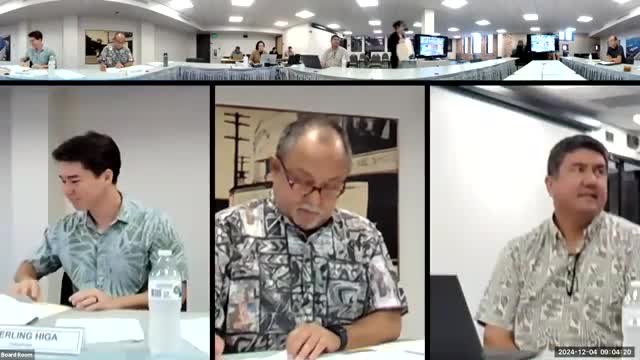Lessee updates HCDA on wetland restoration, food production and education at Kāneʻohe property
Get AI-powered insights, summaries, and transcripts
Subscribe
Summary
Kanekoa Schultz, executive director of Kako'oiwi, told the Hawaiʻi Community Development Authority on Dec. 4 that recent federal and private grants will fund restoration, food production and education across roughly 300 acres, and described program revenues, staffing levels and challenges including invasive species and school-bus costs.
Kanekoa Schultz, executive director of Kako'oiwi, updated the Hawaiʻi Community Development Authority on Dec. 4 about restoration, farming and education work at the lessee's property on Windward Oʻahu, saying recent grants and partnerships will expand active management across hundreds of acres.
In a roughly 30-minute presentation at the authority's meeting at the American Brewery Building and on Zoom, Schultz described grant funding, habitat restoration plans, on-site food production and school outreach. He said Kako'oiwi expects several million dollars in federal and private grants over the next three years and described steps needed to maintain and expand production, protect native species and increase educational access for Hawaiʻi schools.
Schultz told the board, “we're looking at about $10,300,000 in federal, funding and private grants over the next 3 years,” and described individual awards and partnerships that support pond restoration, wetland work and agricultural production. He described a Department of Defense-related REPI grant the presentation identified as roughly $5,300,000 aimed at fishpond restoration, and said other Department of Interior and National Fish and Wildlife Foundation funds support native-planting and wetland work. Schultz said USDA has reclassified some of the property as cropland for federal support purposes.
Why it matters: the site combines wetland restoration, cultural-food production and an outreach program that brings school groups to the property. Schultz said the work supports native-bird habitat and cultural training, and can provide local food and ecosystem services that reduce sediment and stormwater impacts downstream.
Details from the presentation
- Scale and land use: Schultz described roughly 300 acres of wetland and upland property under active management; he said the goal at the end of a three-year funding cycle is to have about 180 acres in active production and management. He described portions of the property as supporting fishpond restoration (described in the presentation as an 80-acre pond), 24 acres of restored wetland and roughly 100–160 acres in production or management, as presented to the board.
- Grants and funding: Schultz said Kako'oiwi has “federal and private grants” totaling about $10.3 million over three years and cited a REPI/DoD-connected award described in the presentation at about $5.3 million. He said other funding sources named in the presentation included the National Fish and Wildlife Foundation, the Department of Interior and private philanthropy. Schultz and his slides also referenced partnerships with federal agencies and nonprofit organizations to support fencing, restoration and infrastructure.
- Food production and revenue: Schultz said the lessee sells products (poi, kulolo and other items) on-site and that sales averaged about $50,000 in the most recent year. He described plans to expand production, to process on-site livestock and to bring mushroom cultivation and other enterprises online.
- Employment and education: Schultz said Kako'oiwi employs 34 people (32 full-time, 2 part-time). He described outreach to roughly 75 schools to date, frequent repeat visits by some programs, and an on-site certified imu (cultural oven) used for fundraising and education. Board members and Schultz discussed the cost of buses for school visits as a barrier to increasing student participation.
- Conservation and invasive species: Schultz outlined work to remove large albizia trees and other invasive vegetation, noted the challenge of processing large amounts of resulting biomass, and described approaches including manual tree removal, possible biochar or wood-mushroom processing, and use of sheep for vegetation management.
- Infrastructure and safety: Schultz described perimeter and interior fencing funded in part by federal earmarks and nonprofit partners to protect restoration areas. He noted homelessness near the property as a management concern and the role fencing plays in protecting newly established native plantings.
Board comments and questions
HCDA board members responded with questions and praise. Member (surname recorded in the transcript as) Life thanked Schultz for the presentation and suggested documenting strategies for other communities; Member Amber Leon asked about employment and fundraising. Schultz confirmed the 34-person staffing figure and said the certified imu had Department of Health approval and has been used for fundraising and educational events.
No formal board action was taken on the presentation. Earlier in the meeting the board approved the regular meeting minutes of Oct. 4, 2023 “as presented.”
Ending
Board members invited Schultz and his team to return with further updates and to host board members at the Kākoʻoʻoiwi property so members could see the restoration and production work firsthand.
